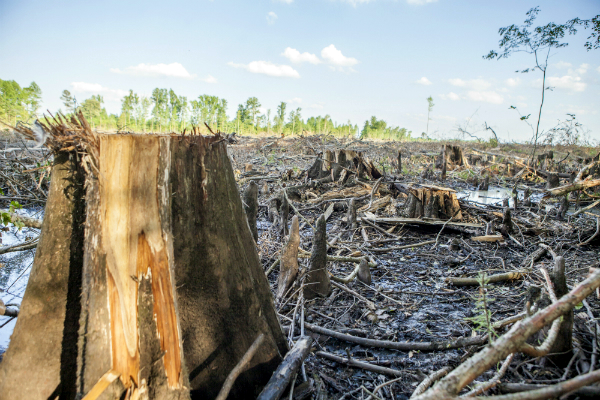BY ADAM MACON
The people of Asheville don’t need any introduction as to why we are lucky to live among the forests of the Southern Appalachians. All we have to do is walk outside, and we’re able to hike, camp, fish, hunt, kayak, raft and swim. This luck isn’t merely by chance, though, as the forests that provide these amenities in the Blue Ridge Mountains — the Nantahala and Pisgah national forests — are protected areas.
Though this is our reality, it could be a different scenario. Imagine that, no matter the time of day, you could drive through your community and see increased logging activities from a completely new industry. Imagine witnessing a precious wetland forest being clear-cut, destroying a wild place that provides a home to countless plants and animals and clean drinking water to millions of people.
In other parts of North Carolina, this is unfortunately a reality. Industrial-scale wood pellet companies like Enviva are sending our forests to Europe to be burned as energy and employing some of the most destructive practices to log North Carolina forests. Since their entry to the Southeast, we have suffered greatly.
By a conservative estimate, Enviva has harvested over 100,000 acres of standing forests since 2013 in North Carolina alone — an area 2.5 times the size of Washington, D.C. The vast majority of this is coming from precious hardwood and bottomland forests. All is to be sent to other countries for energy — and, even more, companies and politicians are labeling it as “green energy” that supposedly benefits the climate and our planet.
Burning forests to keep the lights on increases carbon emissions in the atmosphere for decades. Even more, sourcing this energy from the Southeast is putting some of the world’s most biodiverse and precious forests at severe risk. Communities with wood pellet mills suffer from increased truck traffic, air pollution and noise.
The Pellet Fuels Institute’s annual conference, a gathering of wood pellet industry representatives, is meeting at The Omni Grove Park Inn during the last week of July. Though many of the attendees are focused on small-scale use, joining them will be some of the largest industrial wood pellet producers and burners such as Enviva and Drax. The irony of having a gathering of experts in forest-burning converge in one of the most globally recognized biodiverse forested areas in the world is not lost on me.
Since 2010, Dogwood Alliance’s Our Forests Aren’t Fuel campaign to save Southern forests from logging for bioenergy has sounded the alarm about this issue and called for reform. The Pellet Fuels Institute should be addressing sustainability concerns and working on ways to save forests to both protect us from climate chaos and conserve the natural beauty and biodiversity of Southern forests — not discussing ways to increase the demand for further destruction on the forests of our region. We must do all we can to conserve what we have left.
Adam Macon serves as Our Forests Aren’t Fuel campaign director for the Dogwood Alliance, based in Asheville.





Before you comment
The comments section is here to provide a platform for civil dialogue on the issues we face together as a local community. Xpress is committed to offering this platform for all voices, but when the tone of the discussion gets nasty or strays off topic, we believe many people choose not to participate. Xpress editors are determined to moderate comments to ensure a constructive interchange is maintained. All comments judged not to be in keeping with the spirit of civil discourse will be removed and repeat violators will be banned. See here for our terms of service. Thank you for being part of this effort to promote respectful discussion.